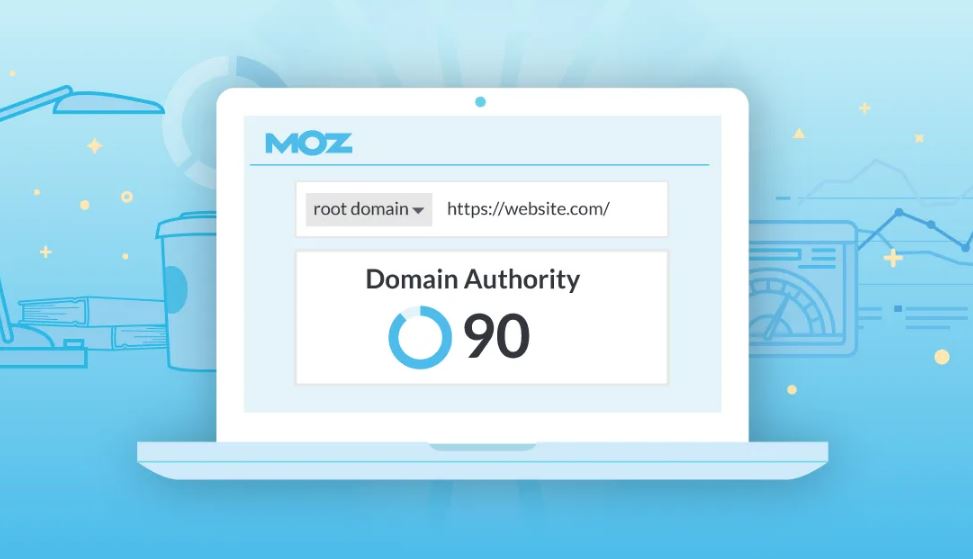When you’re looking to improve your online visibility and appear in Google’s top search results, terms like Domain Authority (DA) and Page Authority (PA) are fundamental concepts.
Both, though technical, are crucial for understanding how search engines evaluate and rank your website.
The better your website’s Domain Authority, the more visibility your site will have.
That’s why it’s important to remember that web authority isn’t something you gain overnight.
Achieving a good domain score is a medium to long-term process.
It’s the result of continuous effort to build a relevant SEO strategy in your sector or business niche.
What is Domain Authority?
Domain Authority is a metric originally developed by Moz and adopted by SEO specialists to estimate how a website may rank in search engines.
Think of Domain Authority or DA as a score for your website, ranging from 1 to 100.
The higher this number, the more likely your site is to appear in Google’s top results.
Why should you care about this web authority metric?
A high DA is synonymous with trust for your users, indicating that your site has been evaluated as relevant and high-quality by other influential sites linking to your content.
Google rewards sites that are relevant to a specific topic by giving them better positions in search results.
So improving your DA means you’re building a strong and reliable web presence, capable of competing in the big leagues of internet searches.
Differences between Domain Authority and Page Authority
Although Domain Authority and Page Authority sound similar, it’s essential to understand their differences to optimize your SEO strategy.
Domain Authority (DA) evaluates the relevance of your entire website, while Page Authority (PA) focuses on the relevance of a specific page within your site.
Page Authority is another Moz metric that measures the likelihood of a specific page ranking well in search engines.
While DA considers the strength of the entire domain, PA focuses on the value of an individual page, based on the links that point directly to it.
Each page on your site has its own PA score, independent of the rest of the site. Therefore, you could have one page ranking well while others do not.
How does Domain Authority affect your ranking on Google?
Although Domain Authority is not a ranking factor directly used by Google, the SEO factors that improve DA, such as high-quality inbound links and relevant content, are indicative of a search engine-optimized site.
A high DA suggests that your site has built positive signals valued by search engines, such as inbound links from sites with high Domain Authority.
Google interprets these links as votes of confidence in your content, resulting in a better ranking in search engine results pages (SERP).
Moreover, a website’s authority influences how your keywords fluctuate in Google rankings.
If your DA is significantly higher than your competitors’, you’re likely to maintain a better position in the SERPs.
Thus, the higher your Domain Authority, the more visibility your keywords will have, allowing you to plan and execute more effective digital marketing strategies.
Tools to Measure Domain Authority
Measuring your web authority is vital to understanding where your site stands in comparison to competitors and to assess the effectiveness of your SEO strategies. Some useful tools for measuring DA include:
• MozBar: A browser extension that lets you see the DA and PA of any web page directly from your browser.
• Ahrefs: Measures Domain Authority and provides a detailed analysis of backlinks and keyword strategies.
• SEMrush: Offers a Domain Authority evaluation along with key metrics such as search traffic and top keywords.
• Majestic: Known for its “Trust Flow” and “Citation Flow,” which help evaluate the quality and quantity of links.
Tips to Increase Your Website’s Authority
Improving Domain Authority is a long-term process that requires consistency and patience.
• Optimize your content strategy: Publish high-quality, relevant content for your audience.
• Get quality links: Work on quality link building from sites with a higher Domain Authority than yours.
• Improve your site’s structure: Ensure your site is fast, secure (HTTPS), and easy to navigate.
• Use interlinking: Link internal pages within your site to distribute Page Authority across your domain.
• Work on social media: Increase visibility and traffic to your content, which may lead to more natural links.
• Conduct regular SEO audits: Identify and fix SEO issues that may harm your ranking and Domain Authority.
Implementing these tips will not only improve your website’s authority but also build a stronger and more reliable online presence.
Remember, an increase in DA reflects your efforts to improve your web positioning and your commitment to having a high-quality site.
Now that you know what Domain Authority is, start planning how you’re going to work on achieving a significant increase in the coming months.




